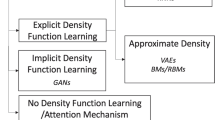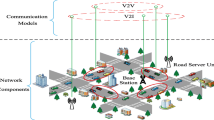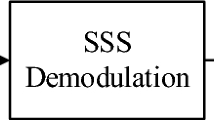Abstract
The unforeseen mobile data explosion poses a major challenge to the performance of today’s cellular networks, and is in urgent need of novel solutions to handle such voluminous mobile data. Obviously, data offloading through third-party WiFi access points (APs) can effectively alleviate the data load in the cellular networks with a low operational and capital expenditure. In this paper, we propose and analyze an attractor-aware offloading ratio selection (AORS) algorithm, which can adaptive select an optimum offloading ratio based on attractor selection for the current networks environment. In the proposed algorithm, the throughput of AP and the cellular load corresponding to the coverage area of the AP, are mapped into the cell activity, which is the reflector of the current network environment. When the current attractor activity is low, the network is dominated by the noise. Then, the noise triggers the controller to select adaptive attractor for each users, the optimal offloading ratio \(\phi \), to adapt to the dynamic network environment. Hence, according to the offloading ratio \(\phi \), the part of the cellular traffic will be transmitted via WiFi networks. Through simulation, we show that the proposed AORS algorithm outperforms the existing ones with 42 % higher heterogeneous network throughput in a dense traffic environment.







Similar content being viewed by others
References
Cisco, Cisco Visual Networking Index: Global Mobile Data Trafic Forecast Update, 2014–2019.
Zhang, H., Chu, X., Guo, W., & Wang, S. (2015). Coexistence of Wi-Fi and heterogeneous small cell networks sharing unlicensed spectrum. IEEE Communications Magazine, 53(3), 158–164.
Niu, Y., et al. (2015). Exploiting device-to-device communications in joint scheduling of access and backhaul for mmWave small cells. IEEE Journal on Selected Areas in Communications, 33(10), 2052–2069.
Rahimi, M. R., Ren, J., Liu, C. H., et al. (2014). Mobile cloud computing: A survey, state of art and future directions. Mobile Networks and Applications, 19(2), 133–143.
Xu, F., Liu, F., Jin, H., et al. (2014). Managing performance overhead of virtual machines in cloud computing: A survey, state of the art, and future directions. Proceedings of the IEEE, 102(1), 11–31.
Lee, K., Lee, J., Yi, Y., Rhee, I., & Chong, S. (2010). Mobile data offloading: How much can WiFi deliver? In Proceedings of the 6th International COnference. New York: ACM.
Rebecchi, F., Dias de Amorim, M., Conan, V., Passarella, A., Bruno, R., & Conti, M. (2015). Data offloading techniques in cellular networks: A survey. Communications surveys and tutorials, IEEE, pp. 580–603.
He, Y., Sun, J., Ma, X., et al. (2013). Semi-random backoff: Towards resource reservation for channel access in wireless LANs. IEEE/ACM Transactions on Networking (TON), 21(1), 204–217.
Huang, S., Eichler, G., Bar-Yam, Y., et al. (2005). Cell fates as high-dimensional attractor states of a complex gene regulatory network. Physical Review Letters, 94(12), 128701.
Rahimi, M. R., Venkatasubramanian, N., & Vasilakos, A. V. (2013). IEEE 6th international conference on music: Mobility-aware optimal service allocation in mobile cloud computing[C]//Cloud Computing (CLOUD). IEEE, pp. 75–82.
Zhou, Y., Zhang, Y., Liu, H., et al. (2014). A bare-metal and asymmetric partitioning approach to client virtualization[J]. IEEE Transactions on Services Computing, 7(1), 40–53.
Fang, W., Li, Y., Zhang, H., et al. (2014). On the throughput-energy tradeoff for data transmission between cloud and mobile devices[J]. Information Sciences, 283, 79–93.
Lpez-Prez, D., Chu, X., Vasilakos, A. V., et al. (2013). On distributed and coordinated resource allocation for interference mitigation in self-organizing LTE networks[J]. IEEE/ACM Transactions on Networking (TON), 21(4), 1145–1158.
Gao, L., Losifidis, G., Huang, J., & Tassiulas, L. (2013). 2013 IEEE conference on economics of mobile data offloading[C]//computer communications workshops (INFOCOM WKSHPS). IEEE, pp. 351–356.
Zhuo, X., Gao, W., & Cao, G., et al. (2011). 19th IEEE international conference on win-coupon: An incentive framework for 3G traffic offloading[C]//network protocols (ICNP). IEEE, pp. 206–215.
Paris, S., Martignon, F., Filippini, I., & Chen, L. (2013). A bandwidth trading marketplace for mobile data offloading[C]//INFOCOM, 2013 Proceedings IEEE. IEEE, pp. 430–434.
Feng, Z., Zhu, Y., Zhang, Q., Ni, L. M., & Vasilakos, A. V. (2014). TRAC: Truthful auction for location-aware collaborative sensing in mobile crowdsourcing[C]//INFOCOM, 2014 proceedings IEEE. IEEE, 2014, pp. 1231–1239.
Lee, J., Yi, Y., Chong, S., et al. (2014). Economics of WiFi offloading: Trading delay for cellular capacity. IEEE Transactions on Wireless Communications, 13(3), 1540–1554.
Jung, B. H., Song, N. O., & Sung, D. K. (2014). A network-assisted user-centric WiFi-offloading model for maximizing per-user throughput in a heterogeneous network. IEEE Transactions on Vehicular Technology, 63(4), 1940–1945.
Im, Y., Joe-Wong, C., Ha, S., Sen, S., Kwon, T. T., & Chiang, M. (2013). AMUSE: Empowering users for cost-aware offloading with throughput-delay tradeoffs[C]//INFOCOM, 2013 proceedings IEEE. IEEE, pp. 435–439.
Elsherif, A. R., Chen, W. P., Ito, A., & Ding, Z. (2013). 2013 IEEE international conference on adaptive small cell access of licensed and unlicensed bands[C]//communications (ICC). IEEE, pp. 6327–6332.
Tian, D., Zhou, J., Wang, Y., et al. (2015). A dynamic and self-adaptive network selection method for multimode communications in heterogeneous vehicular telematics. IEEE Transactions on Intelligent Transportation Systems, 16(6), 3033–3049.
Mehmeti, F., & Spyropoulos, T. (2013). Performance analysis of on-the-spot mobile data offloading[C]//Global Communications Conference (GLOBECOM), 2013 IEEE. IEEE, pp. 1577–1583.
Bianchi, G. (2000). Performance analysis of the IEEE 802.11 distributed coordination function. IEEE Journal on Selected Areas in Communications, 18(3), 535–547.
Ziouva, E., & Antonakopoulos, T. (2002). CSMA/CA performance under high traffic conditions: Throughput and delay analysis. Computer Communications, 25(3), 313–321.
Kashiwagi, A., Urabe, I., Kaneko, K., et al. (2006). Adaptive response of a gene network to environmental changes by fitness-induced attractor selection. PloS One, 1(1), e49.
Hasty, J., Pradines, J., Dolnik, M., et al. (2000). Noise-based switches and amplifiers for gene expression. Proceedings of the National Academy of Sciences, 97(5), 2075–2080.
Zhai, H., Chen, X., & Fang, Y. (2005). How well can the IEEE 802.11 wireless LAN support quality of service? IEEE Transactions on Wireless Communications, 4(6), 3084–3094.
Yang, M., Li, Y., Jin, D., et al. (2014). Software-defined and virtualized future mobile and wireless networks: A survey. Mobile Networks and Applications, 20(1), 4–18.
Acknowledgments
This research is supported by the WLAN achievement transformation based on SDN of Beijing Municipal Commission of Education, and the Grant Number is 201501001.
Author information
Authors and Affiliations
Corresponding author
Rights and permissions
About this article
Cite this article
Hu, Z., Wen, X., Lu, Z. et al. AORS: adaptive mobile data offloading based on attractor selection in heterogeneous wireless networks. Wireless Netw 23, 831–842 (2017). https://doi.org/10.1007/s11276-016-1195-1
Published:
Issue Date:
DOI: https://doi.org/10.1007/s11276-016-1195-1




